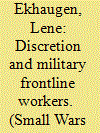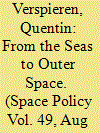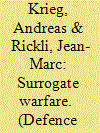|
|
|
Sort Order |
|
|
|
Items / Page
|
|
|
|
|
|
|
| Srl | Item |
| 1 |
ID:
087703


|
|
|
|
|
| Publication |
2009.
|
| Summary/Abstract |
On August 6, 2008, a military coup in
Mauritania ousted the 15-month-old administration
of President Sidi Mohamed
Ould Cheikh Abdallahi. Soldiers seized Abdallahi
(known popularly as Sidi) and his prime minister,
Yahya Ould Ahmed Waghf, and also took control
of the state television and radio stations. They announced
that Mauritania would be ruled by a 12-
man military junta, the High State Council (Haute
conseil d'état, or HCE).
Since Mauritania won its independence from
France in 1960, it has endured nine coup d'états,
though most barely made Western headlines. This
coup was different, however. It occurred exactly
three years after a coup that had been expected to
end all coups-a seizure of power that had prepared
the way for the nation's first democratically
elected government. Mauritania is a desperately
poor country of over 3 million, straddling Arab
and black West Africa and the Sahara and Sahel
regions, and its short-lived democratic experiment
had inspired optimism among those interested in
democratization in the Arab world and Africa.
The 2008 coup was therefore a symbolic defeat.
|
|
|
|
|
|
|
|
|
|
|
|
|
|
|
|
| 2 |
ID:
181960


|
|
|
|
|
| Summary/Abstract |
This article explores how military ‘frontline workers’ use their discretion to interpret and then comply, breach or bypass policies that reach into the tactical level, and why. Based on extensive primary sources including in-depth interviews, end-of-tour reports and data from records, the case study explores the implementation of policies on civil-military relations by military commanders in the Norwegian-led Provincial Reconstruction Team (PRT) in Afghanistan in 2005–2012. This article finds that the commanders used their considerable discretion to implement policies that parted from national directives. In doing so, the Norwegian military strove to align their approach with close allies and NATO and became actual policy-makers. This article contributes to the debate on how western militaries behave at the tactical level by employing the concept of ‘discretion’.
|
|
|
|
|
|
|
|
|
|
|
|
|
|
|
|
| 3 |
ID:
169351


|
|
|
|
|
| Summary/Abstract |
Data collection and information sharing are at the core of any traffic control system. In particular, Maritime Situational Awareness—restricted in this article to one of its main components, the automatic identification system (AIS)—and Space Situational Awareness (SSA) are the backbones of, respectively, maritime and space traffic control frameworks. While the AIS has been initiated by civil authorities for civil purposes and is now being adopted by navies around the world, SSA, originally developed by the military to protect national security assets in outer space is progressively transferred to civil actors. This article shows how and why the intrinsically different nature and history of maritime and space traffics generated a totally reverse approach towards information and responsibility sharing in support to traffic control, while presenting current proposals for the evolution of SSA.
|
|
|
|
|
|
|
|
|
|
|
|
|
|
|
|
| 4 |
ID:
159186


|
|
|
|
|
| Summary/Abstract |
Airpower, drones and cyber-weapons are employed by states in conjunction with local armed non-state actors in an effort to coercively intervene in the crises of the twenty-first century. While the externalization of the burden of warfare is a return to pre-modern war, it is the change in the underlying socio-political relations between the state and its military agent that is a novel phenomenon in surrogate warfare. This article demonstrates that in a post-Westphalian era characterized by non-state violence, globalized conflicts, a prioritization of risk management in a mediatized environment, the state has to explore new ways to remain relevant as the primary communal security provider. Thereby, the organization of violence has departed from the employment of the state’s soldier as the primary bearer of the burden of warfare to a mode of war where technological and human surrogates enable the state to manage the risks of post-modern conflict remotely. In this article, we conceptually explore surrogate warfare as a socio-political phenomenon within the context of globalized, privatized, securitized and mediatized war.
|
|
|
|
|
|
|
|
|
|
|
|
|
|
|
|
| 5 |
ID:
089331


|
|
|
|
|
| Publication |
2009.
|
| Summary/Abstract |
Russia's intervention in the Georgian-South Ossetian conflict has highlighted the need to rigorously examine trends in the public debate over the use of force in Russia. Approaching this debate through the prism of civil-military relations, we take advantage of recent methodological advances in automated content analysis and generate a new dataset of 8000 public statements made by Russia's political and military leaders during the Putin period. The data show little evidence that military elites exert a restraining influence on Russian foreign and defence policy. Although more hesitant than their political counterparts to embrace an interventionist foreign policy agenda, Russian military elites are considerably more activist in considering the use of force as an instrument of foreign policy.
|
|
|
|
|
|
|
|
|
|
|
|
|
|
|
|
|
|
|
|
|